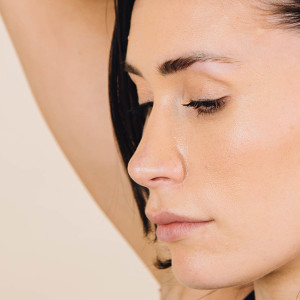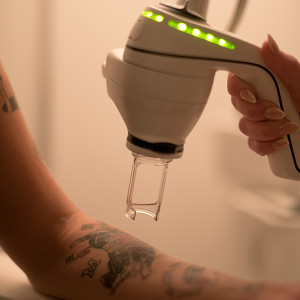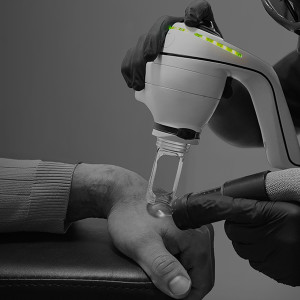Dr. Steven Hubert studied medicine at Cornell University and is a senior medical and surgical dermatologist with more than 20 years of clinical experience in the US.
He takes us through the 20 questions you should ask before going ahead with laser tattoo removal. These queries for your consultant should help you understand the removal process and check that you’re getting the best possible expertise and technology.
1. What results can I achieve?
It’s always best to ask this up front. Not all technology will give you the results you want - whether that’s to fade your ink for a new tattoo, or remove it altogether. Make sure you check whether your tattoo can be removed entirely given its type and colour, as well as your skin type. Different lasers have different levels of effectiveness - you can read more about the most effective tattoo removal here.
2. What are the possible side effects?
Your side effects depend on the technology being used as well as your skin colour and how much training and experience your laser technician has. Pain, bleeding, scarring, discolouration and infection are all potential side effects but their likelihood depends on several variables. Higher energy lasers can cause skin damage, while modern, lower energy lasers don’t cause side effects.
3. What kind of laser do you use?
Whilst you are not expected to be an expert in the specifications and physics of the laser device, it is important that the laser technician uses the latest technology - the faster, lower energy technology tends to be much more effective.
Publish Date in article
“After each removal session, your immune system is responsible for flushing the ink pigment out of your body, so a well-functioning immune system will fade ink faster.”
4. Is the technology being used FDA or CE approved?
Not all laser devices have passed regulatory testing, which means their safety and effectiveness are not guaranteed, so this is a really vital question to ask. Unfortunately, there are knock offs out there that can damage the skin. If the price seems too good to be true then it often is, and the technology being used hasn’t been through all of the regulatory steps. If you’re in the UK, that’s the CE mark and if you’re in the US, that’s FDA approval.
5. Does your laser treat all the colours in my tattoo?
Not all lasers are made equal. And the majority won't treat coloured ink. Certain colours respond better with certain lasers, so it’s worth asking this question to check that you’re going to get the best results. Although some clinics have more than one laser, the vast majority just have one system so make sure that system is going to be able to remove your ink effectively.
6. How many laser tattoo removal procedures has the clinic performed?
Many clinics offer laser tattoo removal alongside lots of other aesthetic treatments such as injectables, dermabrasion or laser hair removal. This means it may not have sufficient knowledge of laser tattoo removal specifically. Experience is crucial in any procedure that can have serious side effects and involves complex equipment, so make sure that you’re confident the clinic in question has a track record with successful ink removal.
Publish Date in article
7. Who will be performing the tattoo removal treatments?
Similarly, check the person treating you is a trained, certified and experienced laser operator. They may have more experience in other treatments, and may be less confident with laser tattoo removal. In the UK, your technician should have an NVQ level 3 for Beauty Therapy and have also completed CPD (Continued Professional Development) for a minimum of three days.
8. Is the treatment painful, and what can you do to make it less painful?
Pain really varies from person to person and also depends on the kind of laser device being used. Lower energy devices tend to cause significantly less pain than those which use higher levels of energy. It’s worth having a conversation with your laser technician about pain management. Sometimes cryotherapy cooling devices are used to prevent excessive heat. This tends to be the best way to manage any pain. Other times topical or injectable anaesthesia can be used.
Publish Date in article
9. How long is each treatment session?
An individual treatment session will last from a few minutes up to an hour, depending on the size of the tattoo and the specifics of the laser, and also whether your laser technician can pass over your tattoo twice. This is only possible with low energy laser tattoo removal like the technology at NAAMA.
Publish Date in article
“One thing you can do before getting laser tattoo removal is protect your skin with a sun-safe skincare routine.”
10. How many treatment sessions will be required to remove the tattoo?
There are a lot of different factors that determine how long tattoo removal will take. The characteristics of the tattoo are important as is your general health and the technology being used. You should take into account how quickly you can come back for each session, which varies depending on the laser. You can read more about that here.
11. How long between treatment sessions?
Some lasers require 6-10 weeks between treatments as the damaged skin needs time to heal, while our advanced, skin-kind LightSense™ laser can treat tattoos as often as every 2-3 weeks. The frequency of your sessions impacts your overall removal timeline, so make sure you ask this question before you go ahead.
12. How do I prepare for tattoo removal?
One thing you can do before getting laser tattoo removal is protect your skin with a sun-safe skincare routine and use a moisturising sunscreen with high SPF when exposing your treatment area to direct sunlight. This is especially crucial within two weeks of your treatment. Exposing your skin to direct sunlight without protection whilst it is still recovering can lead to changes in pigmentation. Check out our post on aftercare here.
Every person and every tattoo is unique, so everyone reacts differently to treatment.
13. How should I take care of my skin after a laser treatment?
In addition to sun protection, often topical creams are recommended to facilitate healing. Your consultant should recommend topical solutions to complement your treatment plan. It’s also essential to look after yourself. Your immune system is going to be working hard to process your ink, so it’s wise to eat well, exercise and get lots of sleep.
14. How will you monitor my progress?
Baseline pictures prior to treatment should be captured so that progress can be compared to the untreated tattoo. Top clinics will use dermoscopy, which magnifies the skin to take photos of the tattoo, so that the ink removal can be very closely monitored.
15. What will you do if my skin doesn't react well to treatment?
Every person and every tattoo is unique, so everyone reacts differently to treatment. If your skin reacts negatively, it could be that laser tattoo removal just isn't right for you, or that you need some more time for skin recovery between sessions. Reputable clinics will monitor progress closely and adapt your treatment plan as you go, perhaps switching up the lasers being used, the treatment protocol or your prescribed aftercare.
Publish Date in article
16. Does smoking affect tattoo removal?
In addition to the many well-documented negative health effects of smoking, there is evidence that smokers heal more slowly, which makes tattoo removal more challenging. It is strongly advised that you stop smoking prior to your first treatment and for the duration of the removal process.
17. How much will it cost to treat my tattoo?
Good salons should offer a number of different pricing options. You can look at a full pricing table for NAAMA here.
18. Do tattoo removal creams work?
Tattoo removal creams do not work. There are no FDA approved tattoo removal creams because these creams can be unsafe, ineffective, and can cause long term damage to the skin. So be careful.
19. Can I get another tattoo in the same area once the treatment is complete?
This depends on whether you have any damage to the skin after being treated. Laser tattoo removal technology has advanced hugely in recent years, so it is now very much possible to have a new tattoo over the treated skin, as well as have your ink faded for a cover up tattoo. If this is your aim, it’s better to go for the most advanced technology available to limit the risk of any skin damage.
20. Will the treatment be covered by my insurance?
Tattoo removal is considered a cosmetic procedure and is generally not covered by insurance. In the UK, the NHS suggest there are some circumstances in which tattoo removal is covered.









